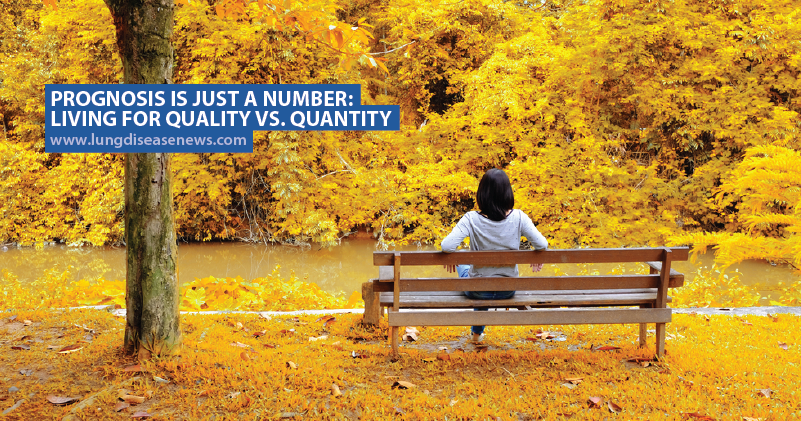A hard truth about being diagnosed with a chronic illness is that there is usually a life expectancy to go with it. Often times, once a patient hears the diagnosis of their disease, there comes a desire to know ‘how long’ one can live with the disease and what the prognosis or outcome will eventually be. There are some diseases that have a more definite prognosis than others, and some whose life expectancy or how long someone can live with their disease is unclear. In the case of Idiopathic Pulmonary Fibrosis (IPF) that prognosis, according to the literature, is between three to five years without a lung transplant or other medical intervention. This is scary, and it often becomes the focus of a newly diagnosed patient. A helpful tip for patients to remember when considering or fearing their life expectancy following the diagnosis of their disease is: a prognosis is just a number.
MORE: When to consider professional help while dealing with PF
The internet is filled with incredible stories of people living beyond their life expectancy with certain diseases, and it seems for them, that their prognosis was entirely wrong. There are stories online, or while in conversations with others that everyone seems to know someone who has beaten the odds of their disease. This can be attributed to any number of things, including: specialized diets that may target or reduce the acute symptoms of their disease, allowing them to live longer without the need for medical intervention. It could be a specialized exercise program that focuses on strengthening their body or the organ that is ill, such as pulmonary rehabilitation for IPF patients. People might be living longer than their life expectancy with a particular disease because of naturopathic remedies to maintain their health such as therapeutic massage, acupuncture, herbal uses or other uses of Chinese Medicine. It’s hard to say if any of these things have contributed to the stories of the individuals who have beaten the odds and lived beyond the expected prognosis of their disease. It’s also hard not to confirm that they haven’t. The truth is, no one really knows why these miracle stories exist; the ones of people outliving their prognosis or life expectancy with a certain disease. What does seem true though is that more and more people are living longer with chronic illnesses than ever before. In addition to these alternative medicines and naturopathic treatments, research is rapidly progressing every day and patients see the results of that regularly. For example, lung transplantation is becoming more successful every year in the treatment of IPF, and medical advancements are happening every day. So where does all of this leave a patient trying to cope their own prognosis or life expectancy after the diagnosis of a chronic illness?
Focusing on days filled with quality memories, love for and from others, as well as happiness, joy, and hope seems to help defer from the reduced quantity of days a patient may have due to a life-threatening illness. One of the gifts of realizing the importance of living for the quality of one’s life vs. quantity actually comes from being diagnosed with a chronic illness, because really, shouldn’t everyone be living this way? It sounds ironic, but living for quality vs. quantity allows a patient to live more in the moment and experience more joy, and this shouldn’t just be for people who have a shortened life expectancy due to a disease. Everyone should be granted the opportunity to realize how much happier they might be if they focus on living for quality vs. quantity. Unfortunately, this lesson seems to only be taught to those diagnosed with a life-threatening illness, or to someone who has had a near-death experience of their own or a loved one. Too many people continue to take for granted that they will live a full, long and healthy life and it’s like they just don’t realize how quickly this could all be taken away from them. It’s cliché to talk about the importance of living every day like it’s your last, but for people faced with a shortened life expectancy or poor prognosis due to a disease, it couldn’t be truer.
The process and thought of facing your own mortality are a hard one, and it takes a lot of emotional energy, courage, and guidance to be able to accept that your life isn’t going to be as long as you once thought it was. Just because it won’t be as long though, doesn’t mean it can’t be just as great. There is something to be said about the gift of choosing to live out your days filled with quality memories and moments vs. quantity. And by doing so, you will never regret the remaining days you do have.
MORE: How to help others deal with your disease
Lung Disease News is strictly a news and information website about the disease. It does not provide medical advice, diagnosis or treatment. This content is not intended to be a substitute for professional medical advice, diagnosis, or treatment. Always seek the advice of your physician or another qualified health provider with any questions you may have regarding a medical condition. Never disregard professional medical advice or delay in seeking it because of something you have read on this website.

